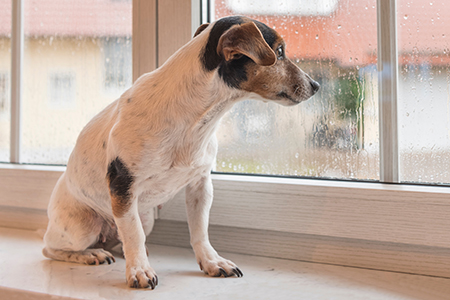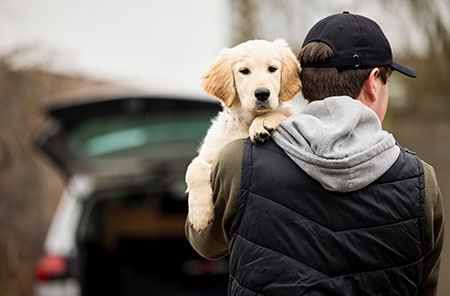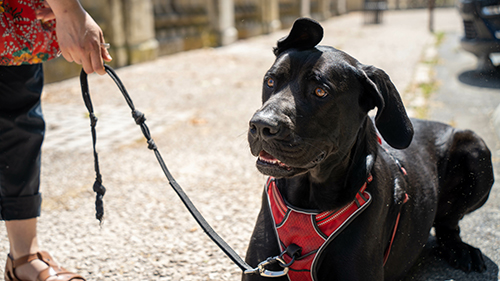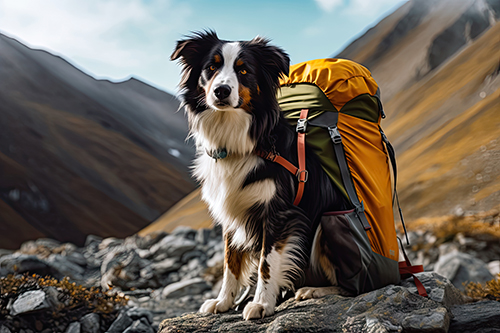Is Your Pet Prepared for Severe Weather?
 Tornadoes, flash floods, ice storms, hail storms, lightening storms – we have all sorts of weather here in northern Alabama. Do you have a plan for your pets’ safety in the event severe weather strikes? Now is the time to prepare for your pets need if bad weather of disasters occur. Whitworth Animal Clinic, serving the communities of Madison, Huntsville, and the surrounding Madison County areas recommends that the best preparation against any type of disaster is to proactively prepare pets for severe weather. Have a plan – for the two legged and four legged members of your family.
Tornadoes, flash floods, ice storms, hail storms, lightening storms – we have all sorts of weather here in northern Alabama. Do you have a plan for your pets’ safety in the event severe weather strikes? Now is the time to prepare for your pets need if bad weather of disasters occur. Whitworth Animal Clinic, serving the communities of Madison, Huntsville, and the surrounding Madison County areas recommends that the best preparation against any type of disaster is to proactively prepare pets for severe weather. Have a plan – for the two legged and four legged members of your family.
Proactive and Calm is the Key
National Severe Weather Preparedness Month should be used as a positive reminder to proactively make preparations for your pets should your family encounter a natural disaster. Including your pet in your preparedness plans, particularly if evacuation is required, reduces potential dangers for the pets themselves, as well as first responders if the situation comes to that. Even more so than their humans, animals can become stressed or anxious at the approach of a severe weather event. Who remembers the thunderstorm scene in the movie Marley and Me? That is why keeping pets calm and secure during is a crucial component to pet disaster preparedness – it minimizes the chance for your pet to be hurt, left behind or lost during a disaster.
What Should You Include in Your Severe Weather Preparedness Plan?
Here are some tips to help in preparing your plan for a possible severe weather event.
Each Weather Condition Needs Its Own Type of Plan: Prepare Pets for severe weather by creating a specific plan for each type of potential weather condition, and make a hard copy of it, kept in a waterproof plastic bag. Your computer may not be available or working during a weather catastrophe. Make sure all of the basics are covered – food, clothing, medical supplies and shelter. Prepare an emergency kit for your pet.
Keep Informed: Pay close attention to local weather broadcasts on the TV, radio, internet and smartphone resources. Listen for sirens. Since many of our pets start acting antsy before a weather change or storm, you may heed their distress as a warning of weather to come.
Shelter: What may be the most important item to keep your pet safe during severe weather? A portable carrier! Make sure you have introduced your pet to a crate or carrier before the event of severe weather so they don’t associate the crate with fear. The first thing you should do before the severe weather arrives is place your pet in the carrier. You may not have the opportunity to search them out if they hightail it under a bed or behind furniture. Also check out hotels in the area that are pet friendly in the case of damage to your home.
Food: Prepare a container of your pet’s food, a bowl, and some bottled water ready in your pet emergency kit and attach it the pet carrier. Also include any medications and their directions, a list of mandatory medications your pet may require, and a copy of their vaccination records in the waterproof plastic bag. A copy of prescriptions is also a good precautionary measure in case of longer term displacement.
Identification: Identification for your pet is important for severe weather preparedness just in case you get separated. Although a microchip is the best option for identification, keep an extra collar with the pet’s name and your best contact number on a tag, as well as a leash in the emergency bag. A current picture of your pet in the emergency kit is also a good idea.
Practice Drills: Just like fire drills at school, walk through your plans so that everyone knows the what, where and how in order to react safely in each potential scenario. Although no one can predict the actual circumstances during an emergency, at a minimum everyone will know where the safety areas are and what roles they have during a severe weather event.
Back Up Plans
Dr. Whitworth stresses that your pets should always be up-to-date on their vaccinations, because if boarding is required, most kennels typically require proof of current vaccinations. And, you don’t know what kinds of insects, water conditions, or other animals they might be exposed to during or after a severe weather event. If possible, set up an arrangement with relatives, friends or neighbors for reciprocal back up caretaker responsibilities should evacuation be necessary, and long term boarding is not an option. For additional information on emergency services and resources, refer to our Related Links page on the Whitworth Animal Clinic website.






